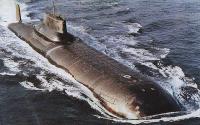Submarines

Quicktabs: Keywords

China is preparing to launch a new ballistic missile submarine that could potentially target the entirety of the United States by the end of 2015.
[ More ]
One largely unseen effect of the Obama administration's decision to send its newest vessels and warplanes to Asia over the last four years is an underseas shadow war between the submarine fleets of both nations, echoing the dangerous sub battles with the Soviet Union during the Cold War.
[ More ]
The Chinese military is poised to send submarines armed with nuclear missiles into the Pacific Ocean for the first time, arguing that new US weapons systems have so undermined Beijing’s existing deterrent force that it has been left with no alternative.
[ More ]
The Arctic could become a site of future turmoil, and not just because of the emerging geopolitical tensions and militarization in the region. Beyond concerns of a frozen conflict in the icy north, there is the additional fear that the Barents and Kara Seas could become the location of a slow-motion nuclear disaster. Until 1991 the Soviet Union used the seas as a junkyard where it would dispose of its nuclear waste and several of its scuttled nuclear submarines could create Chernobyl-like environmental catastrophes.
[ More ]
China will probably begin conducting naval nuclear-deterrence patrols this year, the U.S. Defense Department said on Thursday. Beijing has never before had a credible submarine force that would give it the capability to launch submerged long-range nuclear missiles.
[ More ]
With tensions rising between Russia and Western powers, the U.S. held submarine exercises in the Arctic Ocean - the body of water where the Russian and U.S. subs are likeliest to encounter each other.
[ More ]Submarine forces are a key tool in waging the Global War on Terrorism and their unimpeded use is of crucial significance.58 The use of submarine forces provides a unique tactical advantage because of a submarine's ability to monitor a potential enemy undetected for a long duration.59 The ability to transit the ocean beneath the surface is therefore critical to a submarine's ability to maintain the advantage of covertness.60
The impact of UNCLOS on submarine operations hinges on interpretation of Article 20 of the treaty.61 Gordon England, former Secretary of the Navy, has stated that UNCLOS does not restrict or prohibit submarine activities.62 UNCLOS specifically guarantees the right to conduct transits through international straits in "normal modes", which may include submerged transit in the case of submarines. Nevertheless, the Convention mandates that ships refrain from acts that are "prejudicial," including submerged transit in territorial waters; failure to meet this obligation results in a vessel's loss of innocent passage status.63 But, UNCLOS does not explicitly prohibit submerged transit in territorial seas altogether, especially in international straits.64 This notion is echoed by Deputy Secretary of Defense, John Negroponte, who has stated that UNCLOS "does not prohibit or impair [. . submarine activities in anyway."65"Statement of John D. Negroponte: On Accession to the United Nations Convention on the Law of the Sea and Ratification of the 1994 Agreement regarding Part XI of the Convention ." Testimony before the Senate Foreign Relations Committee, September 27, 2007. [ More (13 quotes) ]
The specific argument that the Convention would prevent the United States from using its submarines to collect intelligence is fallacious. Several sources, including the Minority Views in the Senate Committee on Foreign Relations, note that Article 20 of the Convention requires submarines and other underwater vehicles to navigate on the surface and show their flag when engaged in innocent passage. This is correct, so far as it goes. But the minority report then concludes that this would "fail to protect the significant role submarines have played, especially during the Cold War, in gathering intelligence very close to foreign shorelines."
What the minority report fails to mention is that the 1958 Convention on the Territorial Sea and the Contiguous Zone, to which the United States has long been party, contains exactly the same restriction.39 Moreover, the collection of intelligence in any guise within the territorial sea is not "innocent passage."40 Such operations are called espionage, not innocent passage. The United States would never accept foreign submarines or foreign warships engaging in intelligence-gathering operations in the territorial sea off of San Diego or Norfolk. Indeed, when President Reagan signed a proclamation extending the U.S. territorial sea to twelve nm on December 27, 1988, consistent with the Convention, one of the first things that the Coast Guard did was to advise a Soviet military vessel gathering intelligence just a few miles off of Pearl Harbor to leave the area immediately.42 The U.S. military and intelligence communities are well aware that the Convention would have a positive impact on our national security. Moreover, as Senator Richard Lugar, ranking minority member of the Foreign Relations Committee, has argued, it would be unprecedented for the Senate to deny to our nation's military and national security leadership a tool that they have unanimously claimed that they need, especially during a time of war.43
Assertion #3: U.S. participation in UNCLOS will not undermine intelligence operations. Fact: It is impossible to confirm this assertion because the relevant intelligence activities are classified. It is clear, however, that U.S. participation in UNCLOS is unlikely to facilitate U.S. intelligence activities. For example, a coastal state may demand that all submarines entering its exclusive economic zone surface and identify themselves. Even if the U.S. were a party to the treaty, the Navy would not invoke UNCLOS to justify its presence in these waters when it engages in intelligence operations. Instead, it would simply ignore the demand and avoid being caught. On this basis, it is unclear how the U.S. intelligence community would suffer by not joining the treaty.
Criticisms that under Article 20 of the 1982 Convention submarines are required to navigate on the surface and to show their flag, without noting that this obligation is already binding on the United States under Article 14 of the 1958 Territorial Sea Convention. Nor does this criticism even bother to mention the critical difference between the 1958 and 1982 Conventions, that under the 1982 Convention, this obligation no longer applies in straits used for international navigation. In such straits there is a right under the 1982 Convention of “transit passage,” permitting transit in the normal mode; which includes submerged transit and overflight.
What is certain, however, is that the Russian Arctic-based Northern Fleet is continually “stalked” by American (and perhaps British and French) fast-attack submarines from the moment the Russian sub- marines leave port. While, as noted above, the number of Russian “boomer” patrols has sharply declined since the days of the Cold War, the underwater games of “cat and mouse” continue as before, and several near-collisions have been reported as the Russian subs become increasingly successful in shaking off their American “tails.”54 The Cold War is not entirely over beneath the rapidly melting Arctic ice, and Russia’s nuclear submarine bases north of the Arctic Circle are yet another powerful signal that the Russians intend to enforce their claims in the Arctic. So, while the prospects of major progress on U.S.- Russian bilateral disarmament have never been brighter, the gradual rebuilding of the Russian Northern Fleet’s roster of ballistic missile submarines and the ongoing mission of American SSN’s to track them aggressively has meant increased rather than decreased U.S.-Russian naval competition.
UNCLOS specifically guarantees the right to conduct transits through international straits in "normal modes", which may include submerged transit in the case of submarines. UNCLOS does not explicitly prohibit submerged transit in territorial seas altogether, especially in international straits.
- UNCLOS will not impact U.S. submarine operations
- UNCLOS convention would have no unique effect on ability of submarines to collect intelligence beyond restrictions already agreed to in 1958 convention
- Concerns about submarine passage (article 20) ignore more restrictive requirements of 1958 convention U.S. is already party to
